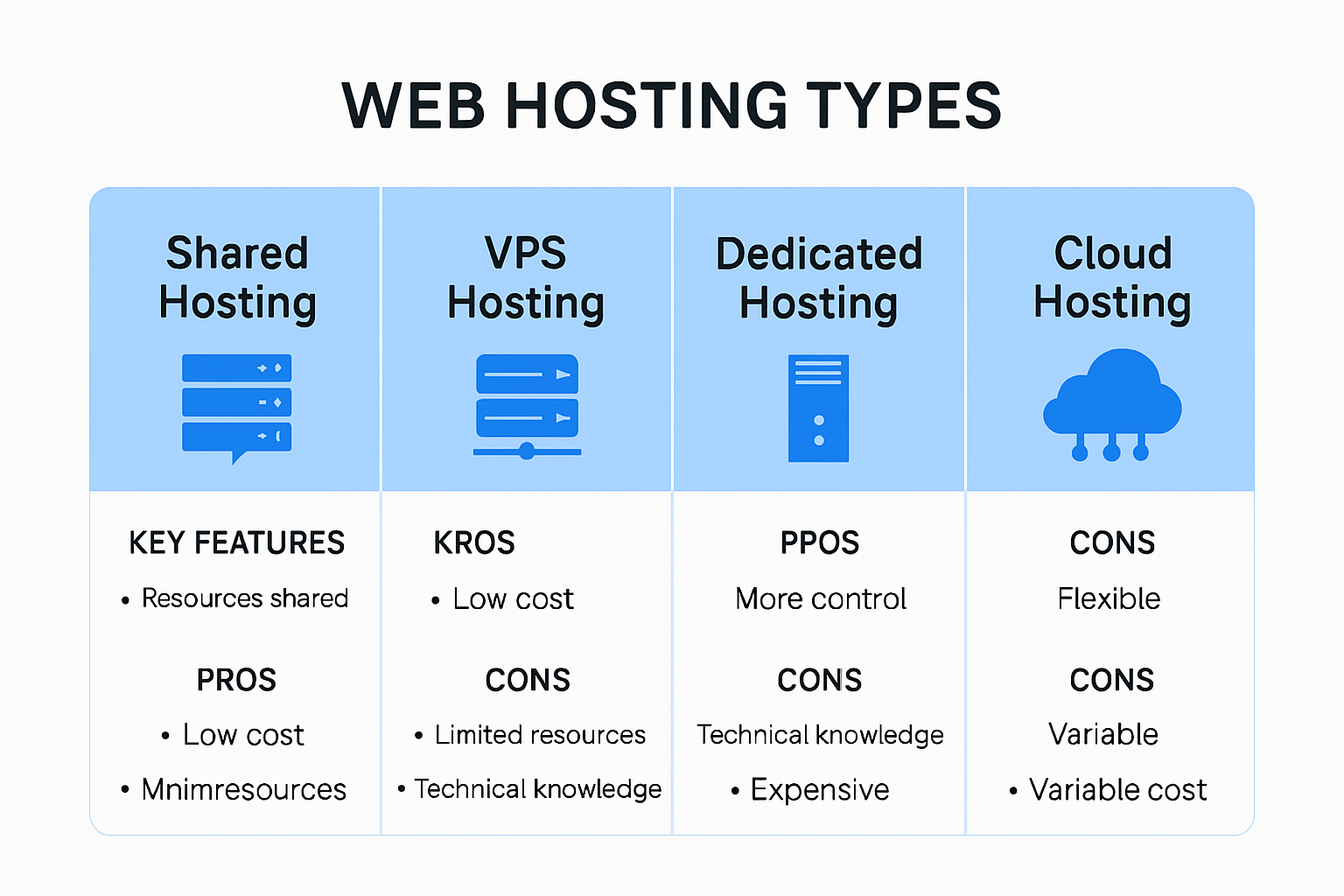Web hosting might sound technical, but it affects every online business in ways you might not expect. Most people think it is just about finding somewhere to park your website files. Yet, a single hour of website downtime can cost South African businesses over R8,000 in lost revenue. Surprising, right? The real story is that your choice of web hosting shapes everything from your site’s security to how fast it loads and how easily you can grow.
Table of Contents
- Understanding What Is Web Hosting
- Types Of Web Hosting For Modern Businesses
- Key Benefits Of Reliable Web Hosting
- Choosing The Best Web Hosting For Your Needs
Quick Summary
| Takeaway | Explanation |
|---|---|
| Choose the Right Hosting Type | Understand various hosting types like shared, VPS, dedicated, and cloud to suit your business needs. |
| Prioritise Performance and Security | Reliable hosting ensures fast loading speeds and robust security measures to protect your data. |
| Evaluate Hosting Costs Beyond Price | Consider total cost of ownership, including performance needs, scalability, and support quality. |
| Assess Future Growth Needs | Select a hosting solution that can adapt to increasing traffic and resource demands over time. |
| Make Strategic Hosting Decisions | Align hosting choices with broader digital transformation goals and technology integration plans. |
Understanding What Is Web Hosting
Web hosting represents the critical digital infrastructure that enables businesses and individuals to publish websites and online applications accessible globally. At its core, web hosting is a service that provides the technological foundation and computational resources necessary to store, manage, and deliver website content across the internet.
The Technical Foundations of Web Hosting
Web hosting essentially functions as a sophisticated digital real estate service where website files, databases, and associated digital assets are stored on powerful computer servers connected to high-speed internet networks. Gartner Research indicates that modern web hosting goes far beyond simple file storage, encompassing complex computational environments that support dynamic online experiences.
These servers, often referred to as web servers or hosting servers, are sophisticated machines designed to process incoming web requests, retrieve appropriate website files, and deliver them rapidly to users worldwide. The infrastructure supporting web hosting involves multiple interconnected technologies:
- Server Hardware: High-performance computers with robust processing capabilities
- Network Infrastructure: High-speed internet connections ensuring minimal latency
- Software Environments: Operating systems and web server software like Apache or Nginx
Types of Web Hosting Services
Web hosting isn’t a one-size-fits-all solution. Businesses can choose from various hosting models tailored to different computational demands and budget considerations. TechCrunch highlights several primary hosting categories:
-
Shared Hosting: Multiple websites share a single server’s resources, making it the most cost-effective option for small businesses and personal websites.
-
Virtual Private Server (VPS) Hosting: Provides dedicated virtual space within a shared physical server, offering improved performance and greater control compared to shared hosting.
-
Dedicated Server Hosting: An entire physical server is allocated to a single client, providing maximum performance, security, and customisation possibilities.
-
Cloud Hosting: Utilises distributed server networks, enabling scalable resources that can dynamically adjust to changing computational requirements.
Understanding web hosting is crucial for businesses seeking a robust online presence. The right hosting solution can significantly impact website performance, user experience, and ultimately, digital success. Modern web hosting is not merely about storing files but creating a responsive, secure, and efficient digital environment that supports your business’s online objectives.
To help you compare the primary web hosting types discussed, the following table summarises their key characteristics for business decision-makers:
| Hosting Type | Key Features | Best For | Scalability |
|---|---|---|---|
| Shared Hosting | Cost-effective, resources are shared | Small businesses, startups | Low |
| VPS Hosting | Dedicated virtual space, more control | Growing businesses | Moderate |
| Dedicated Hosting | Full server control, highest performance | Enterprises, high-traffic | Limited |
| Cloud Hosting | Distributed, scalable resources | Businesses needing flexibility | High |
Types of Web Hosting for Modern Businesses

Modern businesses require sophisticated web hosting solutions that align with their unique digital infrastructure needs, scalability requirements, and budget constraints. Selecting the appropriate hosting type is no longer a simple technical decision but a strategic business choice that directly impacts online performance, user experience, and operational efficiency.
Exploring Contemporary Hosting Architectures
The contemporary web hosting ecosystem offers diverse solutions designed to meet varying computational demands. Amazon Web Services highlights that businesses must critically evaluate their specific requirements before selecting a hosting model. The primary hosting architectures include:
- Shared Hosting: Ideal for small businesses and startups with limited budget and traffic
- Virtual Private Server (VPS) Hosting: Balanced solution offering enhanced performance and controlled resources
- Dedicated Server Hosting: Premium option for enterprises requiring maximum control and performance
- Cloud Hosting: Flexible, scalable infrastructure supporting dynamic business needs
Strategic Considerations for Hosting Selection
Choosing the right hosting solution involves analyzing multiple technical and business factors. U.S. Chamber of Commerce recommends businesses consider the following critical evaluation criteria:
- Expected Website Traffic Volume
- Performance Requirements
- Security Considerations
- Budget Constraints
- Future Scalability Potential
For businesses seeking comprehensive insights into digital infrastructure, our guide on web development strategies provides additional context for making informed hosting decisions.
Enterprise-level organizations increasingly gravitate towards hybrid and multi-cloud hosting strategies that offer unprecedented flexibility. These advanced architectures enable businesses to distribute computational workloads across multiple platforms, optimising performance, reducing latency, and enhancing overall system resilience.
The future of web hosting is not just about storing website files but creating dynamic, responsive digital ecosystems that can rapidly adapt to changing business requirements. Modern hosting solutions provide intelligent resource allocation, automated scaling, and integrated security features that transform traditional web infrastructure into strategic business assets.
Key Benefits of Reliable Web Hosting
Reliable web hosting serves as the fundamental backbone of a business’s digital presence, delivering far more than simple website storage. It represents a comprehensive technological infrastructure that directly impacts operational efficiency, user experience, and overall digital strategy.
Performance and Accessibility Advantages
Businesses depend on web hosting to ensure their online platforms remain consistently accessible and performant. Liquid Web research reveals that inadequate hosting can result in significant financial consequences, with companies experiencing an average of five hours of monthly downtime potentially losing over R40,000 in revenue.
Key performance benefits include:
- Rapid Loading Speeds: Minimising user wait times and reducing bounce rates
- 99.9% Uptime Guarantee: Ensuring continuous website availability
- Global Content Delivery: Accelerating website performance across different geographical regions
- Scalable Resources: Dynamically adjusting computational capacity based on traffic demands
Enhanced Security and Data Protection
Cybersecurity represents a critical consideration for modern digital businesses. Cybersecurity research highlights that robust web hosting provides multiple layers of security protection:
- Advanced Firewall Configurations
- Regular Security Patch Updates
- SSL Certificate Implementation
- Intrusion Detection Systems
- Continuous Threat Monitoring
These security measures protect against potential data breaches, safeguarding sensitive business and customer information from emerging digital threats.
For businesses seeking comprehensive digital strategy insights, our guide to digital transformation offers additional perspectives on leveraging technology effectively.
Reliable web hosting transcends technical infrastructure. It represents a strategic investment that enables businesses to build robust, secure, and responsive digital platforms. By selecting the right hosting solution, organisations can create powerful online experiences that drive engagement, support growth, and maintain competitive advantage in an increasingly digital marketplace.
The table below summarises the main benefits of reliable web hosting and their impact on business operations:
| Benefit | Description | Impact on Business |
|---|---|---|
| Rapid Loading Speeds | Minimises user wait times, reduces bounce rates | Improves user experience |
| 99.9% Uptime Guarantee | Ensures continuous website availability | Increases revenue reliability |
| Global Content Delivery | Accelerates performance in various regions | Broadens audience reach |
| Scalable Resources | Adapts to changing traffic demands | Enables business growth |
| Advanced Security Features | Multi-layer protection against digital threats | Safeguards business & customer data |
Choosing the Best Web Hosting for Your Needs
Selecting the right web hosting solution is a critical strategic decision that directly impacts a business’s digital performance, security, and operational efficiency. The complexity of modern web hosting requires a nuanced approach that goes beyond simple price comparisons and considers comprehensive technological and business requirements.
Critical Evaluation Criteria
Businesses must conduct a comprehensive assessment of their hosting needs by examining multiple interconnected factors. National Institute of Standards and Technology recommends a structured approach to evaluating hosting infrastructure that balances technical capabilities with strategic business objectives.
Key evaluation parameters include:
- Computational Requirements: Processing power, RAM, and storage needs
- Scalability Potential: Ability to accommodate future growth and traffic fluctuations
- Security Features: Advanced protection mechanisms and compliance standards
- Budget Constraints: Total cost of ownership beyond initial hosting fees
- Technical Support Quality: Responsiveness and expertise of hosting provider’s support team
Technical and Strategic Considerations
Modern web hosting selection transcends traditional technical metrics. Businesses must consider how hosting infrastructure aligns with broader digital transformation strategies. This involves evaluating:
- Compatibility with existing technological ecosystems
- Potential for seamless integration with cloud services
- Compliance with industry-specific regulatory requirements
- Geographical data storage and sovereignty considerations
- Performance optimization capabilities

For deeper insights into digital infrastructure strategies, explore our comprehensive web development guide that provides additional context for strategic technological decision-making.
Ultimately, choosing web hosting is not a one-size-fits-all process. Each business requires a tailored approach that considers unique operational requirements, growth projections, and technological complexity. Successful hosting selection demands a holistic view that balances immediate technical needs with long-term strategic objectives, ensuring your digital infrastructure remains flexible, secure, and aligned with your business’s evolving digital ambitions.
Frequently Asked Questions
What is web hosting?
Web hosting is a service that allows businesses and individuals to publish their websites and applications online by providing the necessary technology and resources to store and manage website content.
What are the different types of web hosting services?
The main types of web hosting services include shared hosting, Virtual Private Server (VPS) hosting, dedicated server hosting, and cloud hosting. Each type caters to different requirements and budgets.
How does web hosting affect website performance?
Web hosting impacts website performance by influencing loading speeds, uptime, and the ability to handle traffic. Reliable hosting ensures faster load times and minimizes downtime, which can significantly enhance user experience and business success.
What factors should I consider when choosing web hosting?
When selecting web hosting, consider factors like expected website traffic, performance requirements, security features, budget constraints, and future scalability needs. Evaluating these elements ensures you find a solution that aligns with your business goals.
Ready to Eliminate Web Hosting Worries?
Are you tired of unpredictable website downtime or security concerns costing your business both revenue and reputation? The article revealed how a single hour offline can drain thousands of rands and how the wrong hosting slows growth or exposes your data. Choosing the right infrastructure is no longer just about storage, but building a strong digital foundation through secure, scalable web hosting that keeps your business moving forward.
With Cloudfusion, your business gets more than premium hosting. Our tailored web development and hosting solutions combine cutting-edge technology, local expertise, and reliable support. Let your website work for you by ensuring it loads fast, stays secure, and adapts as your traffic grows. Do not let hosting gaps hold back your success. Get a fast quotation now and start building a digital platform that supports your goals today.








